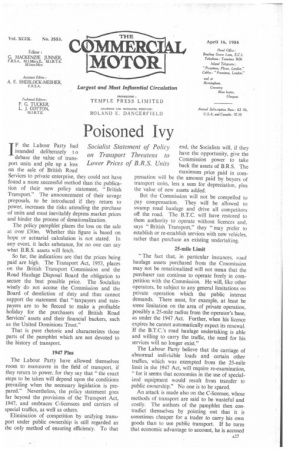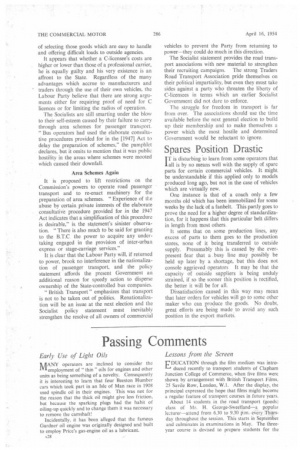Poisoned Ivy I F the Labour Party had intended deliberately to
Page 29

Page 30

If you've noticed an error in this article please click here to report it so we can fix it.
debase the value of transport units and pile up a loss on the sale of British Road Services to private enterprise, they could not have found a more successful method than the publication of their new policy statement, "British Transport." The announcement of their savage proposals, to be introduced if they return to power, increases the risks attending the purchase of units and must inevitably depress market prices and hinder the process of denationalization.
The policy pamphlet places the loss on the sale at over £30m. Whether this figure is based on hope or actuarial calculation is not stated. In any event, it lacks substance, for no one can say what B.R.S. assets will fetch.
So far, the indications are that the prices being paid are high. The Transport Act, 1953, places on the British Transport Commission and the Road Haulage Disposal Board the obligation to secure the best possible price. The Socialists wisely do not accuse the Commission and the Board of dereliction of duty and thus cannot support the statement that "taxpayers and ratepayers are to be fleeced to make a profitable holiday for the purchasers of British Road Services' assets and their financial backers, such as the United Dominions Trust."
That is pure rhetoric and characterizes those parts of the pamphlet which are not devoted to the history of transport.
1947 Plus The Labour Party have allowed themselves room to manceuvre in the field of transport, if they return to power, for they say that "the exact steps to be taken will depend upon the conditions prevailing when the necessary legislation is prepared." Nevertheless, the policy statement goes far beyond the provisions of the Transport Act, 1947, and embraces C-licensees and carriers of special traffics, as well as others.
Elimination of competition by unifying transport under public ownership is still regarded as the only method of ensuring efficiency. To that end, the Socialists will, if they have the opportunity, give the Commission power to take back the assets of B.R.S. The maximum price paid in compensation will be the amount paid by buyers of transport units, less a sum for depreciation, plus the value of new assets added.
But the Commission will not be compelled to pay compensation. They will be allowed to swamp road haulage and drive all competitors off the road. The B.T.C. will have restored to them authority to operate without licences and, says "British Transport," they "may prefer to establish or re-establish services with new vehicles, rather than purchase an existing undertaking.
25-mile Limit The fact that, in particular instances, road haulage assets purchased from the Commission may not be renationalized will not mean that the purchaser can continue to operate freely in competition with the Commission. He will, like other operators, be subject to any general limitations on private operation which the public interest demands. There must, for example, at least be some limitation on the area of private operation, possibly a 25-mile radius from the operator's base, as under the 1947 Act. Further, when his licence expires he cannot automatically expect its renewal. If the B.T.C.'s road haulage undertaking is able and willing to carry the traffic, the need for his services will no longer exist."
The Labour Party believe that the carriage of abnormal indivisible loads and certain other traffics, which was exempted from the 25-mile limit in the 1947 Act, will require re-examination, "for it seems that economies in the use of specialized equipment would result from transfer to public ownership." No one is to be spared.
An attack is made also on the C-licensee, whose methods of transport are said to be wasteful and costly. The authors of the pamphlet then contradict themselves by pointing out that it is sometimes cheaper for a trader to carry his own goods than to use public transport. If he turns that economic advantage to account, he is accused of selecting those goods which are easy to handle and offering difficult loads to outside agencies.
It appears that whether a C-licensee's costs are higher or lower than those of a professional carrier, he is equally guilty and his very existence is an affront to the State. Regardless of the many advantages which accrue to manufacturers and traders through the use of their own vehicles, the Labour Party believe that there are strong arguments either for requiring proof of need for C licences or for limiting the radius of operation.
The Socialists are still smarting under the blow to their self-esteem caused by their failure to carry through area schemes for passenger transport. "Bus operators had used the elaborate consultative procedures provided for in the [1947] Act to delay the preparation of schemes." the pamphlet declares, but it omits to mention that it was public hostility in the areas where schemes were mooted which caused their downfall.
Area Schemes Again It is proposed to lift restrictions on the Commission's powers to operate road passenger transport and to re-enact machinery for the preparation of area schemes. "Experience of the abuse by certain private interests of the elaborate consultative procedure provided for in the 1947 Act indicates that a simplification of this procedure is desirable," is the statement's sinister observation. "There is also much to be said for granting to the B.T.C.the power to acquire any undertaking engaged in the provision of inter-urban express or stage-carriage services."
It is clear that the Labour Party will, if returned to power, brook no interference in the nationalization of passenger transport, and the policy statement affords the present Government an additional reason for speedy action to disperse ownership of the State-controlled bus companies.
" British Transport" emphasizes that transport is not to be taken out of politics. Renationalization will be an issue at the next election and the Socialist policy statement must inevitably strengthen the resolve of all owners of commercial vehicles to prevent the Party from returning to power—they could do much in this direction.
The Socialist statement provides the road transport associations with new material to strengthen their recruiting campaigns. The strong Traders Road Transport Association pride themselves on their political impartiality, but even they must take sides against a party who threaten the liberty of C-licensees in terms which an earlier Socialist Government did not dare to enforce.
The struggle for freedom in transport is far from over. The associations should use the time available before the next general election to build up their membership and to make themselves a power which the most hostile and determined Government would be reluctant to ignore.
Spares Position Drastic
I T is disturbing to learn from some operators that all is by no means well with the supply of spare parts for certain commercial vehicles. It might be understandable if this applied only to models produced long ago, but not in the case of vehicles which are virtually new.
One instance is that of a coach only a few months old which has been immobilized for some weeks by the lack of a fanbelt. This partly goes to prove the need for a higher degree of standardization, for it happens that this particular belt differs in length from most others.
It seems that on some production lines, any excess of parts to them goes to the production stores, none of it being transferred to outside supply. Presumably this is caused by the everpresent fear that a . busy line may possibly be held up later by a shortage, but this does not console aggrieved operators It may be that the capacity of outside suppliers is being unduly strained, if so the sooner this position is rectified, the better it will be for all.
Dissatisfaction caused in this way may mean that later orders for vehicles will go to some other maker who can produce the goods. No doubt, great efforts are being made to avoid any such position in the export markets.




















































































